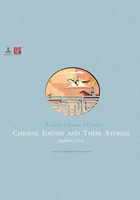
重蹈覆辙 (chóng dǎo fù zhé)
Following the Track
Although many young pupils in China today are unlikely to ever drive an animal-drawn cart in their lives, they are still frequently advised by their teachers or parents to guard against Chong Dao Fu Zhe, or “following the track of an overturned cart.”
This idiom is based on a story about a group of eunuchs during the Eastern Han Dynasty (25-220 AD).
It was a unique political phenomenon in Chinese history that eunuchs in the imperial court often formed cliques to monopolize power and meddle in state affairs. At the same time, they tried all means possible to turn the ruler into the so-called “puppet emperor.”
During the Qin Dynasty (221-206 BC), Hu Hai, the son of the First Emperor of Qin, who built the Great Wall, was deemed a typical “puppet emperor.”
Hu was installed on the throne by a small number of eunuchs who forged the will of the First Emperor of Qin, and was forced to commit suicide three years later.
A similar situation appeared under the rule of Emperor Huan of the Eastern Han Dynasty.
In the court of Emperor Huan, the eunuchs were very powerful. They did not only bend the laws for individual interests, but also brutally suppressed any person who dared to criticize or oppose them.
In 166 AD, the eunuchs framed a case against hundreds of officials and ordinary people and later put them all into prison on charges of “establishing secret cliques and defaming the imperial court.”
After learning about the case, Dou Wu, father of the then empress and an upright official, decided to file a protest to the throne.
In the document, Dou scathingly denounced the eunuchs’ behavior and warned the emperor if he failed to draw lessons from Hu Hai’s experience, he might “follow the track of an overturned cart.”

In addition, the brave and upright official presented his resignation to the emperor, vowing he would never serve in the same court with those villainous eunuchs.
Under great pressure from both in and outside the court, Emperor Huan personally repealed the case and ordered the release of all those imprisoned by the eunuchs.
Today, this idiom is often cited to advise people to draw lessons from the failures of others and avoid following the same road to ruin.